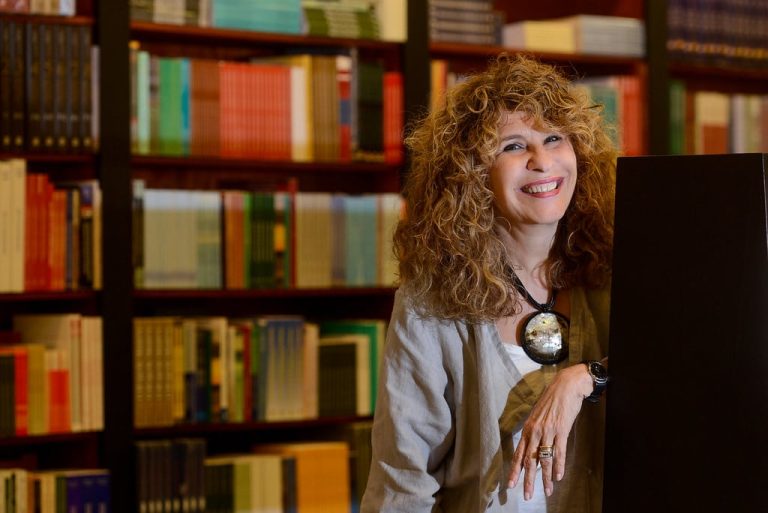7 de noviembre 2021

Children of Exile: The Births “Sowing Hope” in the Camp of Nicaraguan Farmers

PUBLICIDAD 1M
PUBLICIDAD 4D
PUBLICIDAD 5D
The Nicaraguan writer says she has “absolutely no hope” that the ballots “will alter the situation in Nicaragua” since “they’re fraudulent votes.”

La escritora Gioconda Belli denunció que el régimen orteguista impidió que participara en una actividad cultura en España.
Nicaraguan writer Gioconda Belli has become one of the most outspoken critics of Daniel Ortega, her country’s president. This has forced her into leave Nicaragua, dividing her time between the US and Spain. Speaking from exile, she affirms that next Sunday’s event “isn’t an election” but merely the ruler’s “ratification of power”.
In an interview with the EFE news agency, the author and intellectual laments the current situation in the Central American country, and the bleak outlook for the voting process. “I have absolutely no hopes of anything; they’re totally fraudulent elections. What I do hope is that people will become ever more aware of the falsity of this government, and how destructive it is for their interests.”
Belli “totally” supports the voices asking people not to vote in these elections as a sign of protest. As she emphasizes: “they won’t fulfill even minimal democratic standards.”
“It’s all totally arranged. They must even know the percentage with which they want to win. There’s never before been a procedure as corrupt as this one, where all the candidates who could have competed with Ortega have been imprisoned. He’s locked them up to avoid their competing, because he knew that any of them had enormous probabilities of winning,” she adds.
Gioconda Belli, a poet, author and columnist, went into exile this year, in the face of a huge escalation in government arrests of opposition leaders. She states that she harbors “no hopes whatsoever” that the voting “will alter the situation in Nicaragua,” since “it’s all fraudulent.”
“We already know the results; we already know what’s going to happen. It’s the controlled ratification of the power wielded by Daniel Ortega and [his wife and vice president] Rosario Murillo,” Belli affirms.
To the Nicaraguan, the entire process is: “a slap in the face to civility and the civic path that democracy facilitates, so the people can change their government without having to recur to other methods,” that aren’t democratic.
“It’s even tougher, given Nicaragua’s history. It’s scandalous that this regime has made these decisions to avoid having the citizens express their will. For that reason, I totally support the call not to vote. It’s the way to express our repudiation,” she declares.
Since last May, 39 opposition leaders and independent professionals have been arrested within the framework of the current electoral cycle. Among them are seven former aspiring presidential candidates. Belli attributes these arbitrary detentions to the possibilities “that any of the candidates” would defeat Ortega “in clean elections”.
“They arrested them to avoid their competing, because they knew they had enormous probabilities of winning. That’s Ortega’s situation in Nicaragua: he’s so worn out and discredited that any of the candidates he jailed could have beaten him, if the elections had been clean,” Belli insists.
Although she doesn’t trust the president, Belli hopes that following the elections the government will free the political prisoners. “It’s urgent for Ortega to offer a signal that he’ll at least have the chivalry to release the political prisoners after defeating them by making them prisoners. He’s the one who’s morally defeated. What I hope is that he frees the political prisoners.”
Belli notes that the imprisoned candidates are suffering “conditions that violate their rights.” They weren’t allowed access to their lawyers nor to family visits during their first hundred days in jail.
“They’ve allowed them to see their family members only once or twice, [the first time for] a half hour, surrounded by police. They’re not feeding them enough – many have lost weight. They don’t turn the lights off at night; they don’t allow them out in the sun; they haven’t been allowed to receive a single book, a piece of paper, a pencil. These prisoners are the country’s most outstanding figures in terms of political leadership,” she laments.
The author begs the international community, “not to forget Nicaragua.” She’s “concerned”, because “what’s happening [in the country] isn’t widely enough known.”
“It’s very important that this be known and condemned. International pressure must be increased after this electoral farce. There are other things that can be done to try to make that man follow the rules of peaceful coexistence, or at least show some respect for human rights,” she concludes.
This article was originally published in Spanish in Confidencial and translated by Havana Times
PUBLICIDAD 3M
Agencia de noticias internacional con sede en Madrid, España. Fundada en Burgos durante la guerra civil española en enero de 1939.
PUBLICIDAD 3D